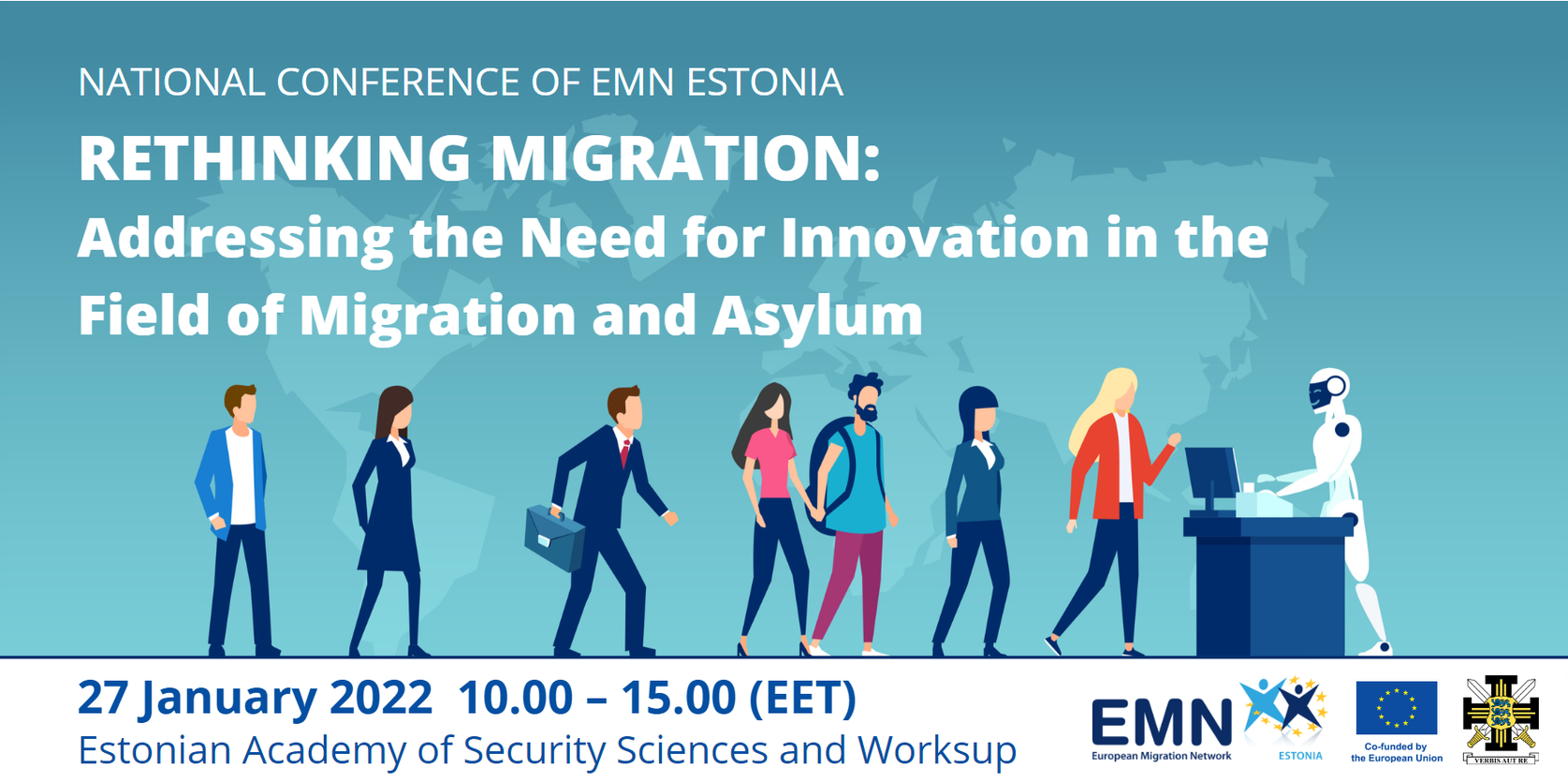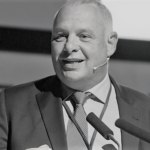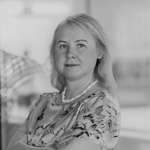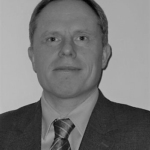Conference of EMN Estonia “Rethinking migration: Addressing the need for innovation in the field of migration and asylum”
Estonia

As trends and patterns of global migration are changing, countries around the world are seeking out innovative ways to manage migration better and to balance the needs of labour markets with long-term goals of social cohesion, social security and humanitarian concerns. Although innovation in the field of migration and asylum can take many shapes and forms, this conference focuses on the creation of innovative migratory pathways and the adoption of new technologies to address the changing realities of migration and asylum.
The conference of EMN Estonia takes place on 27 January 2022 and consists of two sessions. The first session of ‘Rethinking Migration’ conference explores innovative policies in the field of migration, specifically the introduction of talent and skills mobility partnerships and other innovative pathways to create a “triple-win situation” for countries of origin, destination, and the migrants themselves. The aim of such partnerships is to provide a comprehensive framework to better address labour shortages and match skills needs between the EU and third countries, while at the same time engaging third countries strategically on migration. Talent partnerships also occupy a central role in ‘The New Pact on Migration and Asylum’. Additionally, other interesting examples of innovative work-related pathways like digital nomad visas are explored as well.
Alongside policy innovations, there have been significant changes in the tools used in migration management. The use of new technologies has been growing substantially over the last decades, altering nearly every sphere of human life, including migration and asylum management. The global Covid-19 pandemic, however, accelerated the speed of digital transformations in the field of migration and asylum globally. The second session of the conference focuses on innovative tools and the possibilities of using digitalisation and AI in migration management.
EMN Estonia Conference is a hybrid event taking place in Tallinn and online via interactive Worksup environment. The conference aims to bring together policy-makers, representatives from EU Institutions/Agencies, practitioners, academics and experts from Member States and beyond.
Conference will be held in Estonian and English.
Recording of the conference
Speakers
 Adolfo Sommarribas holds a Master of Laws of the University of Michigan. He works for the European Migration Network national contact point of Luxembourg (EMN Luxembourg) since 2011 where he is the Senior Legal Migration Expert. He is also the coordinator of the EMN Platform on Statelessness and Co-Chair of the Ad-Hoc Query Working Group. His main areas of interest are legal migration, identity and document fraud, statelessness, digitalization and artificial intelligence and trafficking of human beings. He is member of the University Council of the University of Luxembourg.
Adolfo Sommarribas holds a Master of Laws of the University of Michigan. He works for the European Migration Network national contact point of Luxembourg (EMN Luxembourg) since 2011 where he is the Senior Legal Migration Expert. He is also the coordinator of the EMN Platform on Statelessness and Co-Chair of the Ad-Hoc Query Working Group. His main areas of interest are legal migration, identity and document fraud, statelessness, digitalization and artificial intelligence and trafficking of human beings. He is member of the University Council of the University of Luxembourg.

Andrei Liimets is a civic activist who works for multiple NGOs on topics such as communication, civic participation, charitable giving and engagement of less privileged young people. Having studied a mixture of philosophy, history, economics and international relations, he regularly writes for multiple media outlets as a freelance culture critic.
 Ave Poom, Senior Policy Officer, has been working in eu-LISA since January 2013 and has witnessed and supported the development of the Agency, with the headquarters in Tallinn, since its establishment. She is responsible for policy matters, stakeholder relations and cooperation with a wide range of partner organisations such as Justice and Home Affairs Agencies, EU Institutions, national administrations and international organisations. Before taking up duties at eu-LISA, Ms Poom worked in the European Commission (DG Home Affairs), the General Secretariat of the EU Council (Police and Customs Cooperation Unit) and the Ministry of Interior of the Republic of Estonia (Department of European Affairs).
Ave Poom, Senior Policy Officer, has been working in eu-LISA since January 2013 and has witnessed and supported the development of the Agency, with the headquarters in Tallinn, since its establishment. She is responsible for policy matters, stakeholder relations and cooperation with a wide range of partner organisations such as Justice and Home Affairs Agencies, EU Institutions, national administrations and international organisations. Before taking up duties at eu-LISA, Ms Poom worked in the European Commission (DG Home Affairs), the General Secretariat of the EU Council (Police and Customs Cooperation Unit) and the Ministry of Interior of the Republic of Estonia (Department of European Affairs).
 Claudia Antonelli is currently a policy officer in the European Commission’s Directorate-General for Migration and Home Affairs, Legal Pathways and Integration Unit. As such, she has been focusing on the external dimension of legal migration. She is seconded from the Italian Ministry of Foreign Affairs, where she dealt mostly with issues related to the Justice and Home Affairs’ external dimension. Ms Antonelli holds a Bachelor’s degree and Master’s degree in International Relations from Bologna University.
Claudia Antonelli is currently a policy officer in the European Commission’s Directorate-General for Migration and Home Affairs, Legal Pathways and Integration Unit. As such, she has been focusing on the external dimension of legal migration. She is seconded from the Italian Ministry of Foreign Affairs, where she dealt mostly with issues related to the Justice and Home Affairs’ external dimension. Ms Antonelli holds a Bachelor’s degree and Master’s degree in International Relations from Bologna University.
 Darek Saunders is the Head of the Border Security Observatory and a Senior Research Officer in the Frontex Research and Innovation Unit. He is responsible for coordinating Technology Foresight, Technology and General Research and the support provided by Frontex to the EU Research and Innovation Programme (Horizon). He joined the Research and Innovation Unit in 2018 after working for almost 8 years in the Frontex Risk Analysis Unit. Darek previously served in the United Nations Security and Safety Service in New York and at the NATO Headquarters of Allied Command Operations in Mons, Belgium. He is a graduate of the Military Academy of Technology in Warsaw and served in the Polish Army as a commissioned officer at both Operational and Strategic levels.
Darek Saunders is the Head of the Border Security Observatory and a Senior Research Officer in the Frontex Research and Innovation Unit. He is responsible for coordinating Technology Foresight, Technology and General Research and the support provided by Frontex to the EU Research and Innovation Programme (Horizon). He joined the Research and Innovation Unit in 2018 after working for almost 8 years in the Frontex Risk Analysis Unit. Darek previously served in the United Nations Security and Safety Service in New York and at the NATO Headquarters of Allied Command Operations in Mons, Belgium. He is a graduate of the Military Academy of Technology in Warsaw and served in the Polish Army as a commissioned officer at both Operational and Strategic levels.

Gladys Roy Chicharro is the Head of Service for Legal Affairs at the Secretariat of State for Migration of the Ministry of Inclusion, Social Security and Migration. She is in charge, among other matters, of the international projects on legal migration that the Spanish Government is promoting and implementing, including those that will be part of the Team Europe Initiative on migration that will be launched at EU level for North West Africa. In addition, and in relation to the Talent Partnerships, she participated in the drafting of the non-paper presented by Spain, Belgium and Germany to the European Commission in June 2021.
 Ivan Dvoilenko is the Deputy Head of The State Migration Service of Ukraine and Chief Digital Transformation Officer. During his time at the State Migration Service, he has been responsible for launching the issuance of biometric travel documents, ID-cards and e-passports for Ukrainian citizens and documents for foreigners, development of national biometric systems, cyber security and national data exchange systems. His educational background is in telecommunications, public administration and law.
Ivan Dvoilenko is the Deputy Head of The State Migration Service of Ukraine and Chief Digital Transformation Officer. During his time at the State Migration Service, he has been responsible for launching the issuance of biometric travel documents, ID-cards and e-passports for Ukrainian citizens and documents for foreigners, development of national biometric systems, cyber security and national data exchange systems. His educational background is in telecommunications, public administration and law.
 Jānis Reiniks holds a bachelor’s degree in philosophy, but has used opportunities to work in both private sector and public administration as a systems analyst, consultant and project manager. His professional experience includes the development of archive solutions, the development and maintenance of visa information system, business and systems analysis, documentation and user support. In his free time he watches documentaries about crime, World War I and World War II but most of his time he devotes to real estate renovation, as it is a challenging to acquire new knowledge and apply it in self-development and property development/maintenance.
Jānis Reiniks holds a bachelor’s degree in philosophy, but has used opportunities to work in both private sector and public administration as a systems analyst, consultant and project manager. His professional experience includes the development of archive solutions, the development and maintenance of visa information system, business and systems analysis, documentation and user support. In his free time he watches documentaries about crime, World War I and World War II but most of his time he devotes to real estate renovation, as it is a challenging to acquire new knowledge and apply it in self-development and property development/maintenance.
 Magnus Ovilius is the Head of Sector for the European Commission’s Home Affairs European Migration Network. Previously he has held several other positions in the European Commission, including Head of Sector of EU Agencies and Networks Coordination (FRONTEX, EUROPOL, CEPOL, eu-LISA, EMCDDA and EASO) and Head of Return Sector at DG HOME, where he was responsible for coordinating activities related to return policy formulation and return management for irregular migration in the EU. Magnus Ovilius holds a degree of Master of Laws from the University of Lund in Sweden.
Magnus Ovilius is the Head of Sector for the European Commission’s Home Affairs European Migration Network. Previously he has held several other positions in the European Commission, including Head of Sector of EU Agencies and Networks Coordination (FRONTEX, EUROPOL, CEPOL, eu-LISA, EMCDDA and EASO) and Head of Return Sector at DG HOME, where he was responsible for coordinating activities related to return policy formulation and return management for irregular migration in the EU. Magnus Ovilius holds a degree of Master of Laws from the University of Lund in Sweden.

Mante Makauskaite is the Co-Founder and Managing Director of AfriKo – a Lithuania based Baltic-Africa research and consultancy centre. Her academic background combines political science and African studies, while professional interests vary from digital economy development to EU-Africa relations. Prior to founding AfriKo, worked with a Norwegian-Lithuanian tech consultancy company specialising in ICT-backed public services reforms in Africa. Mantė has been part of the Digital Explorers – an EU funded ICT talent development and attraction program between Lithuania and Nigeria – leadership team since the birth of the idea till the end of the project.

Maren Krimmer is the Principal Business Analyst at the Estonian e-Residency Initiative. She studied law in France, Germany and Estonia, where she received her PhD in International Law from the University of Tartu. She is a true global citizen and has over 10 years of experience in the legal field, both in the private and public sector with a strong interest in digitalization and international taxation. Next to her professional activities, Maren engages as an international election observer with the OSCE’s Office for Democratic Institutions and Human Rights.

Veronika Vasileva has over 10 years of experience in managing and contributing to studies in the area of migration at EU level. Veronika is an experienced researcher and evaluator of EU policies, funding programmes and agencies in the area of migration, including legal migration, integration, asylum, visa policy and management of EU external borders. As a core team member of the Service Provider team to the European Migration Network, Veronika has led and contributed to numerous EMN studies, annual policy reports and other published reports in the area of migration.